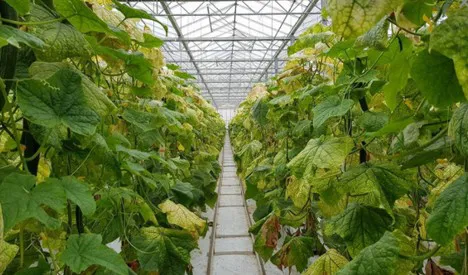Plant virologist Dr. Wulf Menzel from the Leibniz Institute DSMZ-Deutsche Sammlung von Mikroorganismen und Zellkulturen in Braunschweig, together with colleagues from Nuremberg and Freising, have isolated "cucumber virus" cucurbit aphid-borne yellows virus (CABYV) for the first time in Germany. The scientists have now published their results in the renowned scientific journal New Disease Report. In summer 2019, numerous Bavarian farmers reported that their cucumber plants  were infected with an unknown disease. The infection rate in most stands was 90 percent. Overall, the harvest yield fell by up to 50 percent. The serological and molecular tests proved beyond doubt that the plants were infected with CABYV.
were infected with an unknown disease. The infection rate in most stands was 90 percent. Overall, the harvest yield fell by up to 50 percent. The serological and molecular tests proved beyond doubt that the plants were infected with CABYV.
Cucurbit aphid-borne yellows virus
The Cucurbit aphid-borne yellows virus was discovered in France in 1988 and infects cucurbits such as cucumbers, zucchini and squash. An infection leads to chlorophyll deficiency and leaf thickening, among other things, and is accompanied by sometimes massive harvest losses. The virus is transmitted by aphids and is common in the Mediterranean region.
 A look into an infested Bavarian greenhouse / Image: Leibniz Institute
A look into an infested Bavarian greenhouse / Image: Leibniz Institute
Establishment of the virus also expected in Central Europe
The scientists assume that CABYV will also establish itself in Central European countries. "In the meantime, the virus has also been discovered in Slovakia and Poland, for example," says Dr. Wulf Menzel of the DSMZ. "Since both the aphids that transmit the virus and natural virus hibernation hosts (various weeds) are native to our country, it can be assumed that the virus will continue to threaten the populations of the cucurbits in Germany and other countries in northern Europe next year." The plant virologist therefore recommends effective preventive measures when growing cucumbers and the like a greenhouse, such as preventing aphid infestation.
Source: Informationsdienst Wissenschaft (IDW) / Leibniz-Institut
